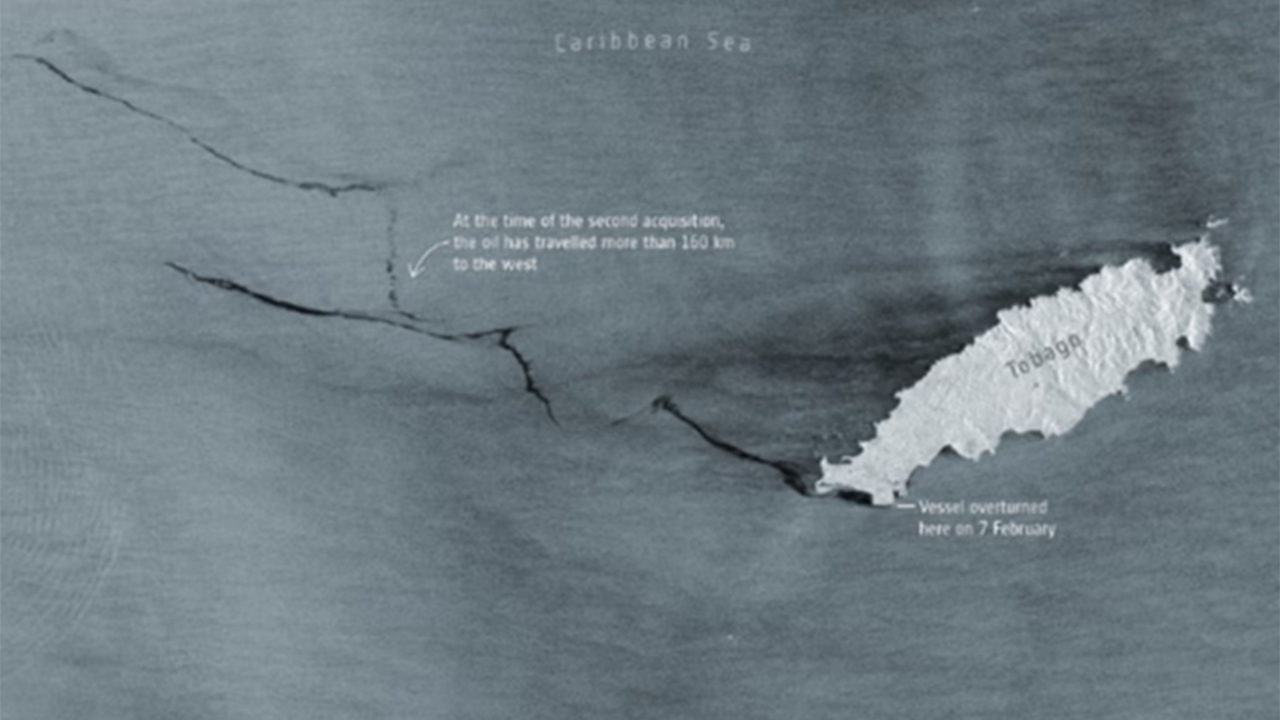Commonwealth _ In a grim turn of events, newly obtained satellite images vividly portray the extensive impact of a colossal oil slick stemming from a sunken vessel near Trinidad and Tobago. The distressing scenes reveal oil steadily advancing across the Caribbean Sea, with dire consequences for the surrounding regions. The incident transpired when a barge, carrying an estimated 35,000 barrels of fuel, capsized approximately 500 feet off Tobago Island on February 7th. Despite ongoing efforts, workers are grappling to contain the relentless flow of oil, which has already transformed the pristine beaches of Tobago into inky expanses, casting a shadow over the peak tourist season, especially during the vibrant Carnival.
The severity of the situation prompted the prime minister of Trinidad and Tobago to declare a “national emergency.” As cleanup operations intensify, the unfolding environmental catastrophe took an unexpected turn when a black plastic bag, containing over a kilogram of cocaine valued at around $75,000, was discovered on a beach near the grounded tanker. Authorities, however, are cautious about linking this discovery to the oil spill at this preliminary stage. European Space Agency (ESA) satellite images, capturing the before and after scenes, vividly illustrate the extent of the crisis. The pictures depict a long and thick black slick of oil expanding across the Caribbean, posing an escalating threat to the marine ecosystem. Authorities remain uncertain about critical details, including the origin of the sunken ship, the type of oil leaking, and the remaining quantity.
With the oil spill extending into Grenada’s waters, concerns mount about the potential repercussions for neighboring Venezuela. The vessel, initially en route to Guyana, was discovered without any discernible information about its ownership or origins. The Trinidad and Tobago government is urgently calling on the barge’s owner to step forward and assume responsibility for the unfolding environmental disaster. The gravity of the situation raises questions about the environmental impact, economic ramifications, and the long-term consequences on the affected nations. As the oil spill encroaches on the territories of neighboring countries, collaborative efforts are crucial to mitigate the ecological and economic fallout. The lack of information about the ship’s ownership and cargo underscores the need for enhanced maritime regulations and accountability in preventing and addressing such incidents.
In the arduous aftermath of the oil spill, the cleanup efforts are confronted not only with the immediate environmental consequences but also with the daunting challenges presented by the potential dissemination of pollutants to distant regions. The tireless endeavors of authorities involve a comprehensive approach, ranging from determining the precise composition of the leaked oil to evaluating its toxicity. Concurrently, strategies are being devised to minimize the far-reaching impact on marine life and delicate coastal ecosystems. This crisis unfolds as a complex tapestry, weaving together environmental, economic, and legal dimensions. The gravity of the situation underscores the crucial need for international cooperation to effectively respond to and prevent such disasters in the future. Collaborative efforts are indispensable in tackling the intricate web of challenges posed by the oil spill, requiring a unified response from nations across borders.
As the ominous advance of the oil slick persists, nations grappling with the fallout are bracing themselves for a protracted and challenging battle. The restoration of the ecological balance and the safeguarding of coastal community’s demand sustained commitment and concerted action. The affected regions are confronted with the urgent task of not only mitigating the immediate impact but also implementing long-term measures to ensure the resilience and vitality of their precious coastal ecosystems.








